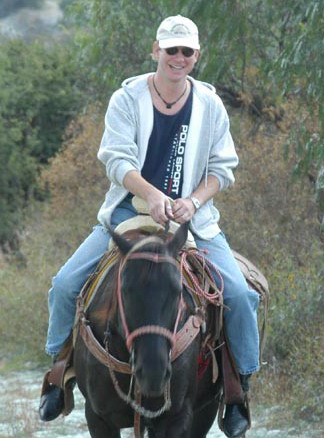My friend Mark has been living in Mexico for over 10 years. His Spanish has been described by native speakers, as the best Spanish that they have ever heard spoken by a gringo. He is fluent and at times he teaches Spanish. His story (courtesy of his partner Victor) is an example of how someone can become almost too comfortable living in another language.
It was the day of the signing of the private purchase-selling agreement for their new home in San Luis Potosi. In Mexico, the signing of this kind of document is a very serious and almost formal ceremony. The notario (or notary - a position more like an attorney in Mexico) is in attendance to oversee and document the transaction. Mark was being appropriately formal, using the “usted” form of speaking with respect to the elderly woman who was selling the home.
When the moment came to sign the documents, Mark took the pen and turned to the woman. “Los impuestos y los servicios están pagados?” he asked. (Are all the taxes and services already paid?) “Por que no quiero tener ningún tipo de PEDOS en el futuro.” (“Because I do not want to have any kind of FARTS in the future.”)
Everybody in the room looked at him with eyes wide open and an expression of OH MY GOD!!!... WHAT IS HE SAYING?!!! When Mark saw the looks on the faces in the room and experienced the deafening silence, he turned and asked, “Did I say something wrong?” Victor leaned in and said, “PROBLEMAS!” (“PROBLEMS! You do not want to have PROBLEMS in the future, Mark. You must say PROBLEMS not FARTS.”)
Of course he apologized to the crowd especially to the elderly woman.
To further enlighten me, Victor provided the following explanation: “In Mexico we use to say Pedos (farts) instead of problemas (problems), but we use this word ONLY with very confident people like family or friends and they know us very, very well. I do not recommend to use this word when you do not know the persons around you. You can get some free problems or being considered low class. Although is fun use it once in a while.”
The purchase of the property went off without a hitch. But we’re pretty certain that the story of the transaction will live on for years to come.
Similarly, I was out in the yard speaking with my gardener the other day. With dismay we were looking at the state of our garden. I wanted to say that the rabbits (conejos) are eating the lettuce. Instead I said, “Los cangrejos estan comiendo las lechugas.” (“The crabs are eating the lettuce.”) My gardener looked at me and smiled. “Creo que no,” he said, (“I don’t think so”) “Estamos son muy lejos del mar.” (“We are very far from the sea.”)

Similar words can also have very different meanings. For example, “cama” means “bed” while “cara” means “face”. A friend from Portland, Oregon, was visiting San Miguel recently. He speaks Spanish fairly well and stopped in to visit his old landlady. As they were talking her pretty young daughter entered the room. “Recuerda mi hija?” his landlady asked, (“Remember my daughter?”) “Si,” he replied, turning to the daughter, “No recuerdo su nombre pero recuerdo su cama.” (“I don’t remember your name but I remember your bed.”)
There was a tense moment before they figured things out and then had a good laugh.





